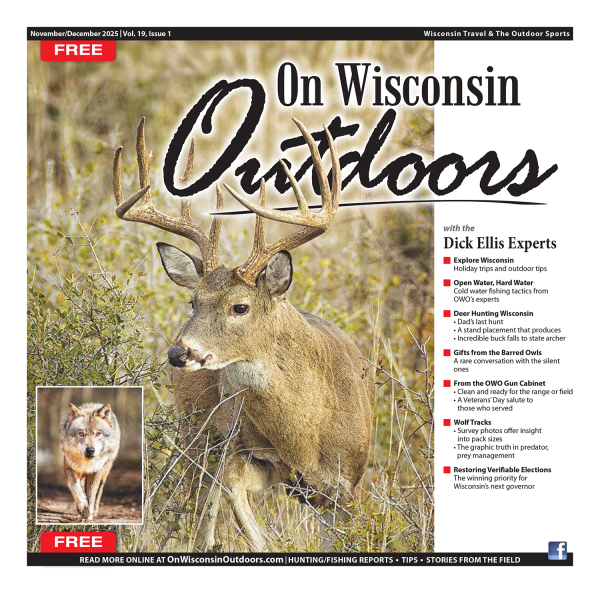Outdoor Report: Help Keep Wildlife Wild
Plus, Youth Turkey Hunt, New Boating Law
And Fire Season Safety
Spring is baby animal season! It's also a great time to remember the importance of keeping wildlife wild.
During the warmer months of spring and summer, the frequency of human-wildlife encounters increases, especially those involving young wild animals. While most of these encounters are harmless, there are times when well-intentioned people interfere in wildlife situations because they incorrectly assume a young animal is orphaned.
Mother animals often leave their young for hours at a time while they look for food, and some animals keep their distance from their young except at meal time to avoid transferring scent that could attract predators.
If you come across a baby wild animal and you don’t see the mother nearby, chances are that mom and baby are doing exactly what they should to stay healthy and safe. Before handling or bringing a baby wild animal to a licensed wildlife rehabilitator, check the DNR’s website for tips to tell if a wild animal truly needs help.
To keep all wildlife wild and healthy, it is also important to be aware of the effects wildlife feeding can have on both humans and animals. Feeding can cause harm to wildlife such as waterfowl, deer or raccoons.
Here are just a few reasons to refrain from feeding wildlife:
- Human food can lead to diseases in wildlife. Most human food does not meet nutritional needs of wildlife and can cause serious health problems.
- Animals have specialized diets. Because human food is nutrient deficient for wildlife, animals may become malnourished or die when fed human food.
- Human food can cause damage to animals. Animals do not distinguish packaging from food, and the packaging may be consumed resulting in abrasions, sickness and even death.
- Animals that lose their fear of humans can become a nuisance.
To learn more and find alternative ways to help wildlife, view our brochure here.
Fire Experts: Stay Vigilant As Wisconsin Fire Season Continues
It’s been a busy wildfire season in Wisconsin so far and it’s only April 9. During the first week of April, 161 wildfires have burned more than 1,000 acres; 19 buildings were destroyed and another 179 were threatened by the flames but saved with fire suppression efforts.
The main fire causes have been debris burning and equipment, accounting for more than half of the fires. However, the two largest fires of the week, in Juneau and Waukesha counties, were ignited along railroads.
Recent rain has given us a bit of a reprieve, but it won’t take long for the dead grass, leaves and pine needles to dry out and be ready to ignite once again.
April is the busiest month for wildfires in our state. Stay vigilant with any outdoor flames, smoke, campfires, ash disposal or equipment use. Put off burning your debris pile until the vegetation "greens up," or becomes less dry after spring rains.
Click here to check daily fire danger, wildfire reports and burning restrictions.
Youth Turkey Hunt Begins April 17
Youth hunters can experience the excitement of Wisconsin turkey hunting with family before the regular season begins. The 2021 youth turkey hunt runs April 17-18, before the statewide turkey opener for period A on April 21.
The youth turkey hunt gives hunters under the age of 16 the opportunity to gain valuable experience. Youth hunters must either have completed hunter education or participate under the mentored hunting program to be eligible for the youth turkey hunt. To participate, a qualified adult must accompany the youth and not accompany more than two youth hunters at one time. The adult mentor must hold any valid 2021 hunting license.
Hunters under the age of 12 and youth without a hunter education safety certificate can participate in the youth turkey hunt under the mentored hunting program. A qualified adult must accompany the youth and follow the youth turkey hunting and mentored hunting program rules.
The Fall 2020 - Spring 2021 Combined Hunting Regulations provides hunters with everything you need to know about spring turkey hunting from season dates, general regulations to shooting hours.
For additional information about turkey hunting in Wisconsin, click here.
Attention Boaters! New Engine Cut-Off Law For Federal Waters
On April 1, the U.S. Coast Guard implemented a new engine cut-off switch law after the law was passed by Congress. This law applies to operators of recreational boats built after January 2020 that are less than 26 feet long.
Operators of these vessels must now have use an engine cut-off switch (ECOS) and associated lanyard (ECOSL) while out on federal waters such as Green Bay, Lake Michigan, the Winnebago System and the Fox River. The new law does not apply if the boat was made before 2020 and does not have a cut-off switch, nor does it apply to boaters on non-federal waters.
- The ECOS and ECOSL prevent runaway vessels and the threats they pose.
- The ECOSL attaches the vessel operator to a switch that shuts off the engine if the operator is displaced from the helm.
- Wireless ECOS are also approved for use.
Here's what you need to know about the law to plan for your spring and summer adventures:
- Boats less than 26 feet in length that generate more than 115lbs of static thrust (~ 2-3hp) and were built beginning in January 2020 must have a device installed. If the boats’ primary helm is inside an enclosed cabin, it is not required to have an ECOS.
- All operators of recreational boats less than 26 feet in length that have an ECOS device installed are required to use the device.
- Unless the boat was built on or after Jan. 1, 2020, boat owners are not required to install a ECOS device. The installation requirement applies to manufacturers, distributors and dealers of “covered recreational vessels” after Jan. 1, 2020.
- The Engine Cut-Off Switch Link doesn’t need to be attached when the vessel is idling or performing docking maneuvers.
The Coast Guard believes that most recreational vessels produced for decades have had an ECOS installed, so this new use requirement simply obligates recreational vessel operators to use critical safety equipment already present on their boat.
There are exceptions to this law. To find out if you need to change your boating practices to boat legally, visit the U.S. Coast Guard’s FAQ.







